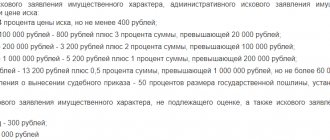We offer an application for the return of the statement of claim for cases where documents were filed in court erroneously or prematurely. The plaintiff has the right to file an application for the return of the statement of claim before the court accepts the claim for proceedings and initiates a civil case. The return of the statement of claim does not have any adverse consequences for the plaintiff. In this case, it will be possible to file the claim again (repeatedly) without any complications.
A statement of claim can be returned from court without consideration only until it is accepted by the court and a civil case is initiated. As a rule, the deadline for accepting a claim is 5 days from the moment the documents are received by the court (Article 133 of the Code of Civil Procedure of the Russian Federation). This period will be the same for both district (city) courts and magistrates.
If the application for the return of the statement of claim is received by the judge after the claim has been accepted for trial by the court, the request will be denied. In this case, a simple refund is not possible. The only possible option is to abandon the claim and terminate the proceedings, which entails negative consequences for the plaintiff. In this case, you can talk with the judge about the possibility of leaving the claim without consideration due to the plaintiff’s failure to appear.
More details
Statement of Waiver of Claims
How to draw up an application to return a statement of claim to court
An application for the return of a statement of claim must be made in writing. There is no established form for this type of appeal to the court. Meanwhile, you should adhere to some rules. The application for the return of the statement of claim must contain:
- name of the court where the request to return the claim is made
- Full name and address of the person. who files an application for return of the claim
- name - Application for return of the statement of claim
- contents of the claim and date of filing the application with the court
- request for the return of the statement of claim indicating the reasons (motives are not required to be indicated)
- date and signature of the applicant
There is no need to indicate other information in the application for the return of the statement of claim; the information listed is quite sufficient to consider the petition and make a decision on it.
Structure and requirements for the document
General requirements for the form and content of the document are established in Art. 131 of the Code of Civil Procedure of the Russian Federation: a claim for the recovery of money must be made only in writing. It states:
- name and address of the court to establish the addressee and verify jurisdiction;
- the name of the plaintiff and defendant, or the name of the organization, or the surname, name, patronymic of an individual (do not forget that economic claims between legal entities and individual entrepreneurs are considered in arbitration). The courts also recommend indicating telephone numbers and other contacts for quick communication with the parties;
- the price of the claim (according to Article 91 of the Code of Civil Procedure of the Russian Federation, this is the full amount of money claimed, except for moral damage);
- amount of state duty.
Next, the name of the document is indicated in the center of the sheet.
Main contents of the claim:
- what is the request to the court (collection of what funds, under what agreement, in what volume);
- the basis for the request is failure to fulfill the terms of the contract, non-payment of interest, etc., which is confirmed by this;
- links to articles of laws (optional, but desirable);
- usually the word “Please” is highlighted in the center, followed by the demand itself indicating specific numbers;
- It is imperative to list the attachments and documents that prove what is stated in the document and are attached to the claim.
Date and signature are also mandatory details of any claim.
Example of a claim for recovery of funds
| IN _____________________________ (name of judicial authority, address) Plaintiff: _________________________ (last name, first name, patronymic in full, address and contact phone number) Respondent: ______________________ (last name, first name, patronymic in full, address and contact phone number) Cost of claim ______________________ (the entire amount of claims under the claim, except for moral damages) State duty_______________________ STATEMENT OF CLAIM on collection of debt incurred under a loan agreement “___”__________ ____, a loan agreement was concluded between me and the defendant _________ (full name), the defendant was lent the amount of _______ rubles, which is confirmed by a receipt from “___”________________. The deadline for the execution of the contract and the return of funds is determined by the contract as follows: “____”_____________. In accordance with Article 810 of the Civil Code of the Russian Federation, the borrower is obliged to return the loan amount to the lender on time and in the manner prescribed by the loan agreement. To date, the debt has not been repaid. Based on the above, guided by Articles 807, 810, 811 of the Civil Code of the Russian Federation, Articles 131-132 of the Civil Procedure Code of the Russian Federation, Ask:
List of documents attached to the application (copies according to the number of persons participating in the case):
Date of presentation of the statement of claim “___”_________ ____ Signature of the plaintiff _______ |
Submission and consideration of an application
An application for the return of the claim is submitted to the same court where the original documents were filed. Both the applicant himself and his representative, who has the appropriate powers certified by a power of attorney, have the opportunity to submit such an application (Article 53 of the Code of Civil Procedure of the Russian Federation).
The judge considers the issue of returning the statement of claim on his own without a court hearing or summoning the parties. Based on the results of consideration of the application, a determination is made. A private complaint may be filed against this determination.
You can find out whether the judge has issued a ruling to accept the claim for proceedings on the court’s website in the judicial records section. An application for return can also be used when the court left the claim without progress to eliminate deficiencies.
Where to apply
Disputes between legal entities and individual entrepreneurs are considered by arbitration; disputes between “physicists” are considered by a court of general jurisdiction (magistrates, city, district). A claim is filed with the magistrate for the recovery of funds if the cost of the claim is no more than 50,000 rubles. In case of a dispute involving consumers - if the claim price does not exceed 100,000 rubles (Article 23 of the Code of Civil Procedure of the Russian Federation). According to the general rule set out in Art. 28 of the Code of Civil Procedure of the Russian Federation, the claim is filed at the place of residence of the defendant (location of the legal entity or its branch). There are exceptions: for example, consumers have the right to go to court at their place of residence. The court considers claims on a territorial basis; the territory of their powers is easy to understand from the name (Kurgan City Court considers cases based on claims presented to residents of Kurgan).
Commentary to Art. 129 Arbitration Procedure Code of the Russian Federation
1. Returning a statement of claim is one of three (along with accepting a statement of claim - Article 127 of the APC and leaving it without movement - Article 128 of the APC) procedural actions that can be performed by an arbitration court after filing a statement of claim.
Part 1 art. 129 of the Arbitration Procedure Code established the following list of grounds for returning a statement of claim:
1) if the arbitration court to which the statement of claim is sent does not have jurisdiction over the case.
Lack of jurisdiction should be understood as a violation of the rules of territorial and generic jurisdiction established by Art. Art. 34 - 38 agro-industrial complex;
2) before changes are made to the APC (see Federal Law dated July 19, 2009 N 205-FZ) as a basis for returning to clause 2, part 1, art. 129 of the APC provided for the combination in one statement of claim of several claims against one or more defendants, if these claims are not related to each other. The current version of Part 1 of Art. 129 of the APC does not contain this basis, therefore, even if one statement of claim combines unrelated demands, the arbitration court is obliged to accept such a statement of claim for proceedings. At the same time, after initiating a case, the arbitration court of first instance has the right to separate one or more combined claims into separate proceedings on the grounds of Part 3 of Art. 130 agro-industrial complex;
———————————
See: commentary to the specified norm, as well as para. 4 paragraph 36 of the letter of the Supreme Arbitration Court of the Russian Federation dated August 18, 2003 N C5-7/uz-931 “On the draft Resolution of the Plenum of the Supreme Arbitration Court of the Russian Federation “On the application of the Arbitration Procedure Code of the Russian Federation when considering cases in the arbitration court of first instance.”
3) if, before the ruling on the acceptance of the statement of claim for the proceedings of the arbitration court, the plaintiff received a request to return the statement.
The request for the return of the statement of claim should not be confused with the abandonment of the claim (see commentary to Part 2 of Article 49 of the Arbitration Procedure Code). One of the differences between these procedural institutions is manifested in the legal consequences: if the refusal of the claim excludes the possibility of filing an identical claim in the future, being the basis for termination of the proceedings (Clause 4, Part 1, Article 150 of the APC), then the return of the statement of claim does not prevent the repeated handling the same requirement (Part 6 of Article 129 of the APC).
Taking into account the rules of Part 3 of Art. 52 and part 4 of Art. 53 of the APC, it should be concluded that the prosecutor, as well as state bodies, local governments, other bodies, organizations and citizens who applied to the arbitration court in accordance with Art. 53 of the APC, also has the right to file a petition for the return of the statement of claim;
4) if the circumstances that served as the basis for leaving the statement of claim without progress are not eliminated within the period established in the ruling of the arbitration court.
For information on the procedure for eliminating deficiencies made by the plaintiff when filing a claim, and the deadline established for this, see the commentary to Art. 128 agro-industrial complex;
5) if the plaintiff’s request for a deferment, installment payment of the state duty, or a reduction in its amount is refused.
Despite the fact that the list of grounds for returning the statement of claim under the construction of Part 1 of Art. 129 of the APC is comprehensive, arbitration practice has quite significantly supplemented it. The reasons for the deviation from the literal interpretation of the commented norm were both purely legislative shortcomings and the legislator’s refusal to use the institution of refusal to accept a statement of claim. So, the practice of applying the APC has revealed the following cases, which also entail the return of the statement of claim.
Failure of the plaintiff to comply with the claim or other pre-trial procedure for resolving a dispute with the defendant, if this is provided for by the Federal Law or the agreement.
In the commentary to Part 3 of Art. 128 of the Arbitration Procedure Code, we indicated that in cases where, at the time of filing a statement of claim, no actions were taken to fulfill the requirements of the claim or other pre-trial procedure, arbitration courts do not consider it possible to apply the institution of leaving the statement of claim without progress. The Supreme Arbitration Court of the Russian Federation, in relation to the consequences of non-compliance with the claims procedure provided for by the Charter of Railway Transport of the Russian Federation, directly indicated the need to return the statement of claim (if this was discovered at the stage of initiating proceedings in the case). Because of this, we are inclined to assume that this approach is a particular manifestation of a more general idea - the idea that any failure by the plaintiff to comply with the claim or other pre-trial procedure, discovered at the stage of initiating proceedings in the case, should entail the return of the statement of claim. And, it must be said that this idea is far from groundless, especially since in a similar situation in civil proceedings the legislator directly points to non-compliance with the pre-trial procedure for resolving a dispute as a basis for returning the statement of claim (see clause 1, part 1, article 135 of the Code of Civil Procedure ).
———————————
See paragraph 45 of the Resolution of the Plenum of the Supreme Arbitration Court of the Russian Federation dated October 6, 2005 N 30 “On some issues of the practice of applying the Federal Law “Charter of Railway Transport of the Russian Federation”.
Failure of the plaintiff to comply with the requirements for the protection of civil rights in an administrative manner.
In accordance with paragraph 2 of Art. 11 of the Civil Code, administrative protection of civil rights is carried out only in cases provided for by law. In this case, a decision made administratively can be challenged by an interested party, including in an arbitration court.
The Supreme Arbitration Court of the Russian Federation indicated that, according to Art. 1248 of the Civil Code, disputes related to the protection of violated or disputed intellectual rights are considered and resolved according to the general rule by the court. The Civil Code provides for cases of protection of intellectual rights in an administrative (extrajudicial) manner (clause 2 of Article 1248). When applying to an arbitration court with a claim that is subject to consideration in an administrative (out-of-court) procedure, the corresponding application must be returned.
———————————
See paragraph 22 of the Resolution of the Plenum of the Armed Forces of the Russian Federation and the Plenum of the Supreme Arbitration Court of the Russian Federation dated March 26, 2009 N 5/29 “On some issues that arose in connection with the entry into force of Part Four of the Civil Code of the Russian Federation.”
So, having discovered in the substantive legislation a norm requiring interested parties to apply for the protection of civil rights in an administrative manner, the Supreme Arbitration Court of the Russian Federation considered that a violation of its provisions should entail the return of the statement of claim. This recommendation contradicts both the literal interpretation of the provisions of Art. 129 of the APC, and the very idea of the inadmissibility of resolving the issue of lack of jurisdiction of the case at the stage of initiating proceedings in the case (the current APC allows this exclusively only at the stage of trial - lack of jurisdiction should entail the termination of the proceedings on the grounds of clause 1, part 1, article 150 APK).
Violation by the plaintiff (applicant) of other rules on jurisdiction.
The above recommendation of the Supreme Arbitration Court of the Russian Federation in relation to disputes related to the protection of violated or disputed intellectual rights is also duplicated in relation to other cases when the plaintiff (applicant) applies to the arbitration court in violation of the rules on jurisdiction.
For example, upon receipt of an application from the tax authority for forced liquidation or declaring bankrupt a legal entity that meets the criteria of an inactive legal entity in accordance with paragraph 1 of Art. 21.1 Federal Law of 08.08.2001 N 129-FZ “On state registration of legal entities and individual entrepreneurs”, this application is returned by the arbitration court to the applicant in relation to clause 1 of part 1 of Art. 129 of the APC, except for cases where the decision to exclude an inactive legal entity from the Unified State Register of Legal Entities was not made due to the receipt of objections on the basis of clause 4 of Art. 21.1 of the specified Federal Law or declared invalid in court.
———————————
See: clause 3 of the Resolution of the Plenum of the Supreme Arbitration Court of the Russian Federation dated December 20, 2006 N 67 “On some issues of the practice of applying the provisions of the law on bankruptcy of absent debtors and termination of inactive legal entities.” A similar recommendation is contained in paragraph 3 of the information letter of the Presidium of the Supreme Arbitration Court of the Russian Federation dated January 17, 2006 N 100 “On some features associated with the application of Article 21.1 of the Federal Law “On State Registration of Legal Entities and Individual Entrepreneurs”.
In a similar way, it is recommended to return applications in cases where “when deciding on the issue of accepting an application to recognize a normative legal act as invalid, the judge finds that in the applicable Federal Law the arbitration court is not named as a court competent to consider such an application.”
———————————
Paragraph 1 of the information letter of the Presidium of the Supreme Arbitration Court of the Russian Federation dated August 13, 2004 N 80 “On some issues arising in judicial practice when arbitration courts consider cases challenging normative legal acts.”
The same idea is voiced in relation to applications for bringing to administrative responsibility for committing an offense, the consideration of which is not covered by Part 3 of Art. 23.1 of the Code of Administrative Offenses to the jurisdiction of the arbitration court.
———————————
See: paragraph 6 of the Resolution of the Plenum of the Supreme Arbitration Court of the Russian Federation dated June 2, 2004 N 10 “On some issues that arose in judicial practice when considering cases of administrative offenses.”
Indication by the plaintiff as a defendant of a branch of a legal entity.
———————————
See: question 11 of the Recommendations of the NCC at the Federal Antimonopoly Service of the Volga-Vyatka District based on the results of the Council meeting dated February 27, 2008 “On the practice of applying procedural legislation.”
Along with adding to the list of grounds for returning a statement of claim, in arbitration practice it is also possible to identify cases where the inapplicability of the institution of returning a statement of claim is especially emphasized.
Thus, the Supreme Arbitration Court of the Russian Federation indicated that payment of the state fee through a representative is not grounds for returning the statement of claim.
———————————
Information letter of the Presidium of the Supreme Arbitration Court of the Russian Federation dated May 29, 2007 N 118 “On the payment of state duties by Russian and foreign persons through representatives.”
Submission by the consignor, consignee, or owner of a non-public railway track of claims against the carrier outside the time limits provided for in Art. 123 of the Charter of Railway Transport of the Russian Federation, subject to compliance with the procedure for filing claims established by the said Charter and the rules for the transportation of goods, is not a basis for the return of the statement of claim.
———————————
See paragraph 42 of the Resolution of the Plenum of the Supreme Arbitration Court of the Russian Federation 06.10.2005 N 30 “On some issues of the practice of applying the Federal Law “Charter of Railway Transport of the Russian Federation”.
The applicant’s omission of the established part 4 of Art. 198 of the APC, the period for challenging a non-normative legal act, decision, action (inaction) of a state body, local government body, other body, or official cannot be regarded as a basis for returning an application.
———————————
See paragraph 11 of the Recommendations of the NCC at the Federal Antimonopoly Service of the Ural District No. 1/2006 based on the results of the meeting held on December 7-08, 2005 in Yekaterinburg; approved by the minutes of the meeting of the NCC at the Federal Antimonopoly Service of the Ural District dated February 17, 2006 N 1 (https://fasuo.ru/ nauchno-konsultativnyj_sovet/ nauchno_konsultativnyj/ rekomendatsii_nks_20051207).
The territorial distance of the defendants from the arbitration court to which the statement of claim (application) was sent is not provided for by the rules of the APC as a basis for its return.
———————————
See section V “Return of statements on other grounds” of the Review of the practice of the Arbitration Court of the Chelyabinsk Region on issuing rulings on the return of statements of claim (statements, demands, complaints) and the reasons for their cancellation in 2007 (https:// www.chelarbitr.ru/ Arbitrazhnaja_praktika/ Obzory/ Obzory_ sudebno_ praktiki_ Arbitrazhnogo_ suda_ Cheljabinsko_ oblasti/ Obzor_praktiki_ po_vyneseniju_ opredeleni_o_ vozvraschenii_ iskovyh_ zajavleni_ v_2007_godu).
“If the circumstances that served as the basis for leaving the statement of claim without progress are eliminated, the arbitration court has no legal grounds for issuing a ruling on the return of the statement.”
———————————
See: paragraph 7 of the Review of judicial practice of returning statements of claim (statements) by judges of the Arbitration Court of the Moscow Region in 2005 and the first quarter of 2006 // https:// www.arbitr.ru/ as/ pract/ ac_prac/ ?id_rubric=1 .
2. Part 2 art. 129 of the APC determines the content of the determination to return the statement of claim.
The current APC has normatively established the quite reasonable practice of arbitration courts, when the said definition indicates not only the grounds for returning the statement of claim, but also immediately resolves the issue of returning state duties from the federal budget.
The indication in the ruling on the return of the application of a new circumstance that was not previously indicated in the court ruling as the basis for leaving the application without progress does not comply with the requirements of Art. Art. 128, 129 APC.
———————————
See paragraph 5 of Section III “Return of statements due to failure to eliminate the circumstances that served as the basis for leaving the application without progress” of the Review of the practice of the Arbitration Court of the Chelyabinsk Region on issuing rulings on the return of statements of claim (statements, demands, complaints) and the reasons for their cancellation in 2007 (https://www.chelarbitr.ru).
The ruling on the return of the statement of claim must be made by the arbitration court within five days from the date of receipt of the statement of claim by the arbitration court (see commentary to Part 1 of Article 127 of the Arbitration Procedure Code).
On the deadline for issuing a ruling on the return of the statement of claim in cases where the statement of claim was previously left without progress, see the commentary to Part 4 of Art. 128 APK.
3. Part 3 art. 129 of the Arbitration Procedure Code has established an extremely short period for sending a copy of the ruling on the return of the statement of claim - one day.
According to the literal interpretation of the commented norm, a copy of this determination is sent only to the plaintiff. At the same time, it is obvious that in cases where a procedural plaintiff (prosecutor or state bodies, local government bodies, other bodies, organizations and citizens entitled to apply to the arbitration court in accordance with Article 53 of the Arbitration Procedure Code) filed a statement of claim, a copy of the ruling about the return of the statement of claim must also be sent to him.
4. The possibility of appealing a determination to return a statement of claim is an important procedural guarantee of the constitutional right to judicial protection.
Who can appeal this determination?
We believe that such persons should include only subjects whose procedural rights are directly affected by the ruling: the plaintiff, a third party making independent claims regarding the subject of the dispute, and procedural plaintiffs (prosecutor, as well as state bodies, local governments, other bodies, organizations and citizens who applied to the arbitration court in accordance with Article 53 of the Arbitration Procedure Code).
5. For the plaintiff, the rule that in the event of a cancellation of the ruling on the return of the statement of claim, the statement of claim is considered filed on the day of the initial application to the arbitration court, in a number of cases can have important substantive consequences (break in the limitation period - Part 1 of Art. 203 of the Civil Code, the size of the discount rate of bank interest when collecting interest under Article 395 of the Civil Code, etc.).
6. Repeated appeal within the meaning of Part 6 of Art. 129 of the APC is a new independent statement of claim, the issue of acceptance of which will be considered according to the general rules of Chapter. 13 APK.
7. The institution of returning a statement of claim is not applicable to appeals that, from the point of view of procedural law, cannot be qualified as statements of claim (for non-claim proceedings - statements).
Thus, in relation to the procedure for initiating cases of bringing to administrative responsibility and cases of challenging decisions of administrative bodies on bringing to administrative responsibility, the Supreme Arbitration Court of the Russian Federation indicated that “upon receipt of a protocol on an administrative offense and other documents without an application, the court returns them to the administrative body without issuing a ruling in due to the lack of grounds for deciding the issue of initiating proceedings in the arbitration court.”
———————————
See: Paragraph 5 of the Resolution of the Plenum of the Supreme Arbitration Court of the Russian Federation dated June 2, 2004 N 10 “On some issues that arose in judicial practice when considering cases of administrative offenses.”
8. It should be noted that the current APC generally does not include the institution of refusal to accept a statement of claim.
This, however, does not mean that the grounds previously established in Art. 107 of the Arbitration Procedure Code of 1995 no longer impede the progress of the case. The impossibility of considering a case beyond the jurisdiction of the arbitration court, as well as a case identical to one already considered (or being considered), has remained, but now the arbitration court must first initiate such a case and then terminate it (clauses 1, 2, 3 of part 1 of Art. 150 of the APC) or leave the claim without consideration (clause 1, part 1, article 148 of the APC).
At the same time, as we indicated in the commentary to Part 1 of this article, it is necessary to take into account the recommendations of the Supreme Arbitration Court of the Russian Federation, which allow for a fairly widespread use of the institution of returning a statement of claim.
9. On the return of the statement of claim when accepting a counterclaim, see the commentary to Part 4 of Art. 132 APK.
When is the state fee refunded?
You can count on a fee refund in the following cases:
- If by mistake a larger amount was transferred than required.
- If the court refused to accept the appeal (complaint, statement of claim, etc.).
- If the claim was left without consideration or the proceedings were terminated.
- If the person who went to court and paid the fee did not agree to take a legally significant action before going to arbitration.
Attention! If a settlement agreement was concluded between the litigants before the court made a decision on the case, then the state duty is returned in the amount of 50% of the amount paid (we are talking about the Supreme and arbitration courts).
The fee is not refunded if the defendant voluntarily satisfied all the demands of the opposing party during the consideration of the case or after the court made a decision.
Fill out the application
The application form was approved by Order of the Federal Tax Service of Russia dated February 14, 2017 No. ММВ-7-8/ [email protected] The form requires filling out 2 sheets. All information must be entered carefully (if it is entered by hand), each letter or number must be entered in a separate cell.
Sheet 1 (title)
This sheet should contain the following information about the organization wishing to return the state fee:
- INN and checkpoint of the company.
- Application number. It indicates the number of times a taxpayer applies for a refund of the fee this year. If the previous statement was written with errors, then the next (corrective) one will also have the next number in order.
- Code of the tax service at the place of registration of the individual entrepreneur or company.
- Company name without abbreviations or full name of the entrepreneur.
- Article 333.40 of the Tax Code of the Russian Federation. It regulates all issues related to the return or offset of state duties.
- Type of overpayment. Enter the required number.
- Payment Description. Here we write the number “2”, since the duty is a fee.
- The amount of the refunded amount.
- Duty payment date.
- OKTMO code. You can find it at this link: .
- KBK state fees. You can find it here. Let's assume that we need to return the state duty paid to the arbitration court. Select code 18210801000011000110. Enter it into the application without spaces.
- Number of sheets of the application and attached copies. The number is entered in the format “00X”.
- Confirmation of the accuracy of the specified information. In the first cell, indicate with a number the person who confirms the accuracy of the information. Then the head of the company enters his full name, phone number, dates and signature.
Filling out the first sheet of the application is now complete.
Sheet 2
We enter the information on this sheet as follows:
- We again indicate the company’s tax identification number and checkpoint.
- Next, enter the name of the bank where the tax office will have to transfer the refund.
- Name of bank account: current account.
- Correspondent account.
- BIC.
- We indicate whose account it is and enter the account number.
- We write the name of the company.
The application is ready.
Attached papers
The Federal Tax Service will not return the state fee based on only one application. You will need to attach the following documents to it: rulings, decisions or certificates from the courts indicating the basis for the return of this payment, as well as copies or originals of payment documents (checks, receipts).
If the state fee is refunded in full, then you must attach the original payment document. If partially, then a certified copy. In this case, the original must be left for further actions.
Essence and legal grounds for refusal
The plaintiff has the right to terminate the resolution of the dispute in court by withdrawing the statement of claim. Also, the victim may not waive all claims, but only some of them. In this case, the court will continue to consider the case, but its proceedings will only move on to the remaining claims.
In appellate arbitration, a refusal can be made before the final decision is made (according to paragraph 2 of Article 49 of the Arbitration Procedure Code of the Russian Federation).
IMPORTANT - filing a refusal does not mean its acceptance by the court if it violates the rights of other parties to the process.
In what cases is it served?
A refusal can be filed for various reasons and circumstances that changed the plaintiff’s opinion or attitude during the consideration of the case. The main waivers are if:
- The defendant voluntarily settled all claims.
- Circumstances changed during the judicial investigation - new facts were discovered, the plaintiff’s demands lost their relevance or became unfounded.






